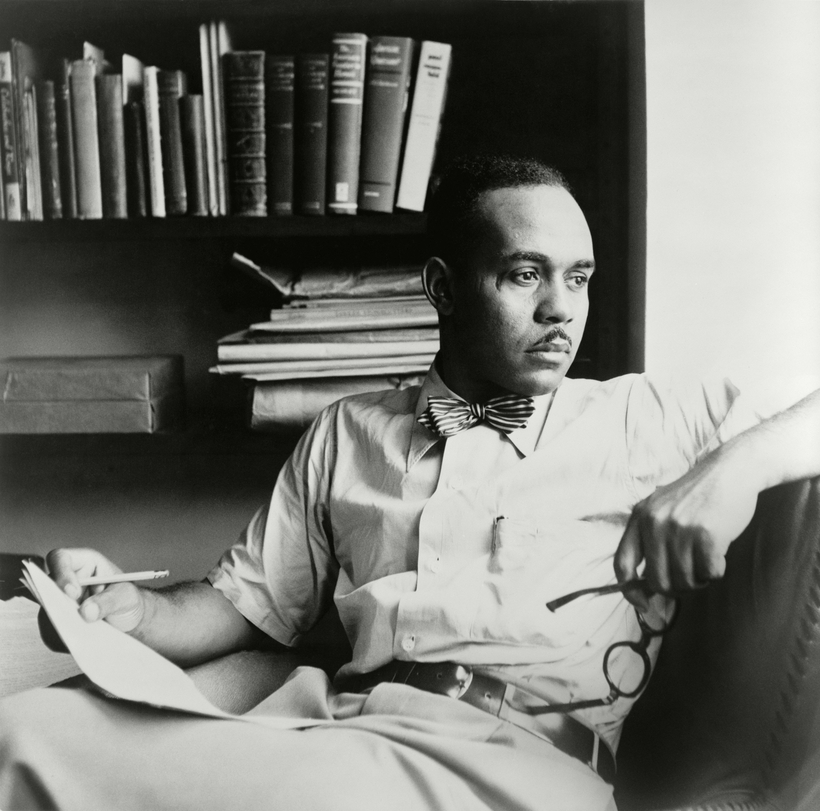Ralph Ellison, who died in 1994 at the age of 80, remains famous for precisely one novel: Invisible Man, the richly detailed, complex chronicle of an unnamed black man whose travels from the South to New York City constitute what critic Lev Grossman has called “the quintessential American picaresque of the 20th century.” The book, published in 1952, not only won the National Book Award but has since sold several million copies around the world.
Ellison never completed a second novel, dismaying not only his fans but himself. He blamed a fire in his home in 1967 for destroying part of the manuscript, but as we learn in the splendid The Selected Letters of Ralph Ellison, he struggled for the rest of his life with the pressures of writing another novel that he deemed worthy of Invisible Man.
His letters make up for not doing so, since they display such sharp intelligence and full engagement with the literary and political issues of the day. John F. Callahan, editor of the book and Ellison’s literary executor, prefaces each decade’s collection of letters with essays that brilliantly illuminate the context and content of what Ellison has written.
In 1969, Ellison responded to a request by the owner of the famous Gotham Book Mart for a list of books that influenced him when he was young. “This letter is one of my favorites because although it is couched in the form of a list, what he writes her is much more than that,” Callahan tells Air Mail. “His love for books is so contagious, eclectic, and deep that he can barely cite three titles in a row without throwing in a detail that places the given book in his life, and the life of his mind.”
To Frances Steloff
730 Riverside Drive
New York, N.Y. 10031
SEPTEMBER 19, 1969
Miss Frances Steloff
The Gotham Book Mart
41 W. 47th Street
New York, New York 10036
Dear Frances:
It is difficult for me to decide which particular books influenced me most as a teenager, for I read haphazardly and voraciously anything and everything in print, including pulp magazines, boys adventure books, the family doctor book and an odd Bible in which the scriptures were conveyed in pictorial symbols. There was also, of course, the King James Version, and the Bible—as sermon, as song, as equipment for living, as stylistic example—was primary.
But the Bible was more or less imposed upon one and when I try to recall the vast conglomeration of books which came after the Brownie Books and the fairy tales of pre-adolescence my favorites were The Boy Scouts Handbook, Tom Sawyer and The Adventures of Huckleberry Finn— and the hero of which I admired so much that I nicknamed my brother “Huck” in his honor. Along with these works of Mark Twain I admired a boy’s edition of Moby-Dick, Cooper’s Leather Stocking Tales (especially The Last of the Mohicans), Sinclair Lewis’ Arrowsmith, Albion Tourgee’s Congaree Sketches (which to the dismay of my eleventh grade American lit. teacher I tried to convert to verse!), Edgar Allan Poe’s Tales, which linked up with certain Negro American ghost stories and stories of hidden treasure; a book about a Spanish picaro, Juan Cigarella, whose adventures closely paralleled those of John, the slave trickster of Negro American folk tales, Jack London’s The Call of the Wild, and the short stories of Guy de Maupassant. I also read and reread Dickens’ A Tale of Two Cities, the Arabian Nights, Stevenson’s Treasure Island, Ruskin’s story, The King of the Golden River, and the Adventures of Sherlock Holmes.
But one of the most influential series of books read during the period of early adolescence were the plays of Bernard Shaw, which I discovered in the library of a friend’s parents. The prefaces to the plays were especially fascinating and did more than any teacher to make me aware of how exciting non-fictional prose could be. They were also my introduction to the relationship between ideas, art, and politics.
To these works I would add The Souls of Black Folk by W. E. B. DuBois, The Weary Blues and Fine Clothes to the Jew by Langston Hughes, and a work with a title so long that although I became aware of it almost as early as I became conscious of the Bible, I must leave to the last: The Golden Treasure of Poetry and Song: A Compete Fireside Cyclopedia of the Best Verse in the English Language Over Thirteen Hundred Complete Poems by Nearly Two Hundred Authors Comprising the Best Poems of the Most Famous Writers for Four Centuries, English and American, Including Poems of Humor, Pathos, Patriotism, Nature, Religion and Sentiment, Arranged under Appropriate Division with Author and Subject Index, Compiled and Edited by Henry T. Coates. As handy as its title, this book belonged to my father but scrawled on one of its end papers is to be found one of my earliest attempts (unsuccessful) at writing my name.
Sincerely,
Ralph Ellison

